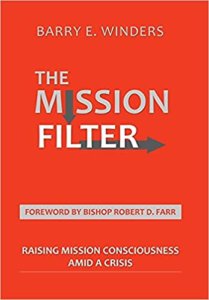Barry Winders says the COVID-19 crisis is a hinge point for the church. This pivotal time demands mission-focused leaders lest the church slip back into the busyness and nonmissional activities of the pre-COVID-19 past.
Whether we accept it or not, the COVID-19 pandemic crisis is a hinge point for the church. The church’s mission remains the same. But the execution of that mission has looked different during COVID-19 and will likely continue to be different after the crisis has passed.
You cannot always do in a crisis what you were doing before. The crisis demands something different from us to do the mission. It comes down to a binary choice. Do you want to be a pre-COVID-19 church that refuses to see the opportunities for mission created by the pandemic or a post-COVID-19 church that views the crisis as an opportunity to revitalize its mission?
Opportunity underlines the mission of the church — making disciples. Opportunity to wonder if God is inviting us into something new. We need to make sure that we do not carry over from pre-COVID-19 into post-COVID-19 something that eliminates our mission. If we carry over the infections of nonmissional activities and busyness, the disruption for the church will be longer lasting than COVID-19 itself.
Focus on “why”
As we are figuring out how to function during this pandemic, there may be a temptation for the “why” to become dormant in the endless details of converting to new methods of doing church. The “why” cannot be forgotten. The “why” is more indispensable now than ever before. The “why” is a fragile thing but robust in its reach.
Again, you may ask, “What will the church look like on the other side of the pandemic of 2020?” A mission filter can more readily identify harmful practices and attitudes we harbored pre-COVID-19. Non-mission activities are as contagious as the virus; non-mission busyness is especially infectious and can create a congregational culture of infections. Now these contagions can be captured and filtered so the mission guides forward-thinking adaptation and change. The mission remains bold and robust.
No turning back
For pre-COVID-19 folks who are hoping to return to the way things were before the crisis, there is no evidence of learning any lessons that were revealed during the crisis. This kind of thinking requires little or no leadership at all. Things rarely turn out the way we hope. Sometimes we can be lucky and figure out why. But the most valuable lesson we can learn is that a person can find the lesson and learn from it, and that is better than being lucky any day.
Maybe we have been asking the wrong questions during this pandemic. Pre-COVID-19, we relied on in-person worship and in-person small groups. We have repeatedly asked, “When are we going back to in-person services? When can we have Sunday school or small groups?” Those are the wrong questions to ask.
The importance of focusing on mission
Some have found gratitude in this season of COVID-19. Others have discovered the lessons of generosity and patience. But what about the mission? The lessons of gratitude, generosity, and patience point to the mission of the church at the awakening of the crisis. The contemporary church is often built on protecting the community and sustaining the status quo, oftentimes at the exclusion of other people. But how could excluding groups of people benefit the people who are doing the excluding?
Making disciples can be easily desensitized and derailed by social media and chatter that promotes divisiveness, exclusion, scarcity, and resistance to change. Using a mission filter focuses the leaders’ attention on the mission and eliminates the desires of the people in the organization to do the minimum. It accentuates the aspiration, the chance to make a difference instead. Isn’t that what has happened in many instances during the COVID-19 crisis?
Why is a mission filter so critical for the church at the hinge point of the pandemic? The mission will be the same. The execution of the mission may be different. If a mission filter is needed, it is needed even more in a crisis. Any imagination and innovation in doing things is oiling the hinge so that we do not become rusty and lose our usefulness for the mission. This worldwide crisis demands more of our leaders. At this pivotal time, leaders can do three things to direct their awareness of the mission. They must listen, imagine, and lead.
Barry E. Winders is author of  The Mission Filter: Raising Mission Consciousness Amid a Crisis (West Bow Press, 2021).
The Mission Filter: Raising Mission Consciousness Amid a Crisis (West Bow Press, 2021).
Related Resources
- So That: Two Powerful Words for Mission Results by Lovett H. Weems, Jr.
- New Questions for a New Day by Michelle Snyder
- Why the Church’s Mission Really Matters in this Time of Crisis by Tony Hunt







